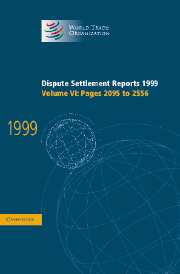Book contents
- Frontmatter
- Contents
- Canada - Measures Affecting the Importation of Milk and the Exportation of Dairy Products (WT/DS103): Report of the Panel
- Turkey - Restrictions on Imports of Textile and Clothing Products (WT/DS34): Report of the Appellate Body
- Turkey - Restrictions on Imports of Textile and Clothing Products (WT/DS34): Report of the Panel
Canada - Measures Affecting the Importation of Milk and the Exportation of Dairy Products (WT/DS103): Report of the Panel
Published online by Cambridge University Press: 22 December 2017
- Frontmatter
- Contents
- Canada - Measures Affecting the Importation of Milk and the Exportation of Dairy Products (WT/DS103): Report of the Panel
- Turkey - Restrictions on Imports of Textile and Clothing Products (WT/DS34): Report of the Appellate Body
- Turkey - Restrictions on Imports of Textile and Clothing Products (WT/DS34): Report of the Panel
Summary
INTRODUCTION
This proceeding has been initiated by two complaining parties, the United States and New Zealand.
In a communication dated 8 October 1997 (WT/DS103/1), the United States requested consultations with Canada in accordance with Article 4 of the Under- standing on Rules and Procedures Governing the Settlement of Disputes (“DSU”), pursuant to Article XXII:1 of the General Agreement on Tariffs and Trade 1994 (“GATT 1994”), Article 19 of the Agreement on Agriculture, Article 30 of the Agreement on Subsidies and Countervailing Duties (“the SCM Agreement”) and Article 6 of the Agreement on Import Licensing Procedures with respect to export subsidies of Canada on dairy products and the administration by Canada of its tariff- rate quota for fluid milk and cream. The United States and Canada held consultations in Geneva on 19 November 1997 but these consultations did not result in a resolution of the dispute.
On 29 December 1997 New Zealand requested consultations with Canada pursuant to Article 4 of the DSU, under Article 19 of the Agreement on Agriculture and Article XXII:1 of the GATT 1994 with regard to Canada's Special Milk Classes Scheme. New Zealand and Canada held consultations on 28 January 1998 but these consultations did not result in a resolution of the dispute.
On 2 February 1998, the United States (WT/DS103/4) and on 12 March 1998, New Zealand (WT/DS113/4), each requested the establishment of a panel with standard terms of reference.
In its request, the United States claims that:
(a) “The Government of Canada is providing subsidies, and in particular export subsidies, on dairy products through its national and provincial pricing arrangements for milk and other dairy products without regard to the export subsidy reduction and other WTO commitments under- taken by Canada. Specifically, the Government of Canada established and maintains a system of special milk classes through which it maintains high domestic prices, promotes import substitution, and provides export subsidies for dairy products going into world markets. These practices distort markets for dairy products and adversely affect US sales of dairy products.”
(b) “In addition, although Canada committed under the Marrakesh Agreement Establishing the World Trade Organization to permit access to an in-quota quantity of 64,500 tonnes (product weight basis) under a tariff-rate quota for imports of fluid milk and cream, Canada has refused to permit commercial import shipments within the quota.
- Type
- Chapter
- Information
- Dispute Settlement Reports 1999 , pp. 2097 - 2344Publisher: Cambridge University PressPrint publication year: 2002
- 2
- Cited by



